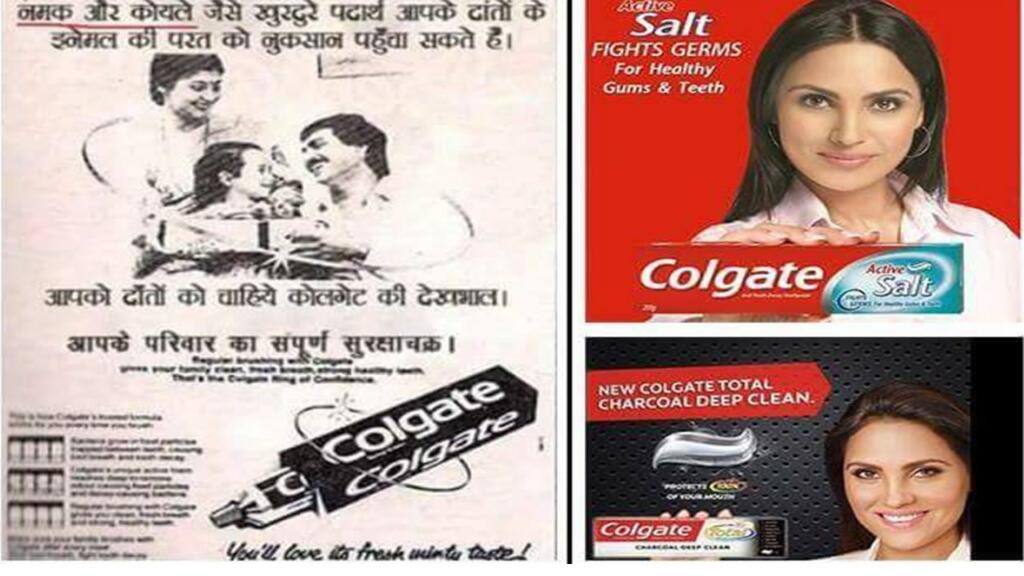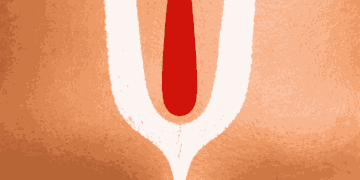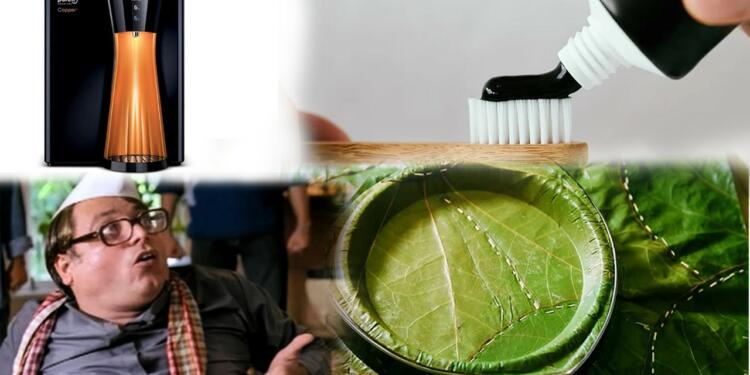Copper Filters: How do you define hypocrisy in two images? Nothing, just look at this:

There was a time when sipping from copper or brass utensils or brushing your teeth with neem twigs seemed old-fashioned, even uncivilized. Back then, the westernized world and some of our own intellectuals saw us as backward for these practices.
Fast forward to today, and you’ll see a striking transformation. The very same folks who once criticized our traditions now market them as valuable commodities. From “activated charcoal” toothpaste to “neem coated toothbrushes”, to even “ionized copper filters,” they’ve turned our desi wonders into marketable commodities, that reap massive profits.
To quote Mr. Nanjibhai, “Mera maal churaake mujhe hi bechta hai?” [You steal my stuff and dare to sell it back to me?]. This, my friends, is the epitome of hypocrisy.
But then, that’s the West for you! Today, we shall unearth this Western hypocrisy, where perceptions and practices shift with the winds of profit, and where the old can become new again, all under the watchful eye of the ever-evolving market. Let’s explore the intricacies of this paradox and unmask the many faces of Western hypocrisy that surround us.
Using our wonders to shame us
If anyone perfected the art of embracing hypocrisy, it’s the advertising agencies. They’ve mastered the maxims of Macaulay, using our local wonders to shame us.
For instance, if you grew up in the 70s or 80s, you might recall that Colgate ad. In the heart of a village, a brawny bodybuilder asks his sister-in-law for “doodh-badam” (almonds in milk) and “koyla” (charcoal). Her retort, sharp and witty, rings out: “Arre wah devarji, badan ke liye doodh-badaam, aur daaton ke liye koyla? (Wow! A health drink for the body but charcoal for the teeth?)”
The voice-over chips in, urging you to use Colgate tooth powder, for “khurdare padaarth” (abrasive substances) can harm your precious enamel.
Fast forward to 2015, and Colgate’s toothpaste advertisement does a complete 360. Now, it claims the power of charcoal, boldly stating, “kehte hain charcoal ghazab ki safai kar sakta hai….”
Also read: The story of VOLTAS air conditioners: Monopoly, failure and resurrection
When Colgate first came to India, they condemned the practice of using salt or datun for brushing, proclaiming that salt would destroy your teeth. Yet, now their ad asks, “Kya apke paste mei Namak hai?” (Does your toothpaste contain salt?).
This isn’t an isolated case. In 2016, a German company named Leaf Republic introduced an “innovative” collection of tableware made from leaves. The West marveled at this new creation, presented with sophistication. Yet for Indians, it was like “repackaging our own heritage” and selling it back to us.
Biodegradable plates and cutlery made from dried leaves have been an integral part of our culture for millennia. From community feasts and weddings to roadside snack shops, these crinkled dried-leaf plates and bowls have been an everyday part of Indian life.
In India, it’s not just about what you eat; it’s also about how you eat. A mouthful of phuchka or pani-puri, that world-famous flavor bomb, is never as satisfying in a plastic or steel bowl as it is in the traditional ‘sal pata’ bowl.
Ironically, despite its impressive design and robust marketing, the same company, Leaf Republic, shut down in 2018. An unfortunate incident contaminated all their raw materials from India en-route. The very culture they tried to appropriate ended up playing a part in their demise.
How modernity paved way for Copper Filters and Cardiac Coherence Breathing Exercises
In the intricate web of advertising, the concept of ‘repackaging’ thrives, with age-old traditions cleverly presented as novel innovations. As consumers, it’s imperative that we become astute differentiators, separating genuine progress from the appropriation of our heritage.
For a tangible example, look no further than the buzz around “Intermittent Fasting.” Google it, and you’ll find it’s about abstaining from food for a specified period. The most popular regimen involves fasting for 16 hours daily and eating within an 8-hour window. But isn’t this a ripoff of our Vrata module? In our own culture, we practice something akin to this – the ‘solah-somwaar’ fast, where devotees abstain from food on 16 consecutive Mondays during the holy month of Shravan, devotedly seeking blessings from Bhagwan Shiva.
Then, there’s Navratri, a nine-day fasting festival where participants rely on water, fruits, and sometimes gluten-free buckwheat meals. The essence is the same – training the body to endure without a constant food supply.
Also read: Indian products with the funniest ads ever
What’s more, the very West that once ridiculed our use of copper and brass utensils is now touting the health benefits of copper, presenting it in filters as if it were a newfound revelation. They even craft new terms like “Cardiac Coherence Breathing Exercise” to describe what we’ve known as Pranayama for ages.
And let’s not forget their attempts to patent our indigenous treasures like neem and turmeric, while they dismiss them as primitive. Our own challenge lies in the dependence on Western validation. Until someone ‘gora’ (white-skinned) approves, we often fail to acknowledge the worth of our own products. Although we’ve made strides in this regard, it’s a mentality we still need to overcome.
In this era of paradoxical ad campaigns and evolving market dynamics, recognizing the reimagining of our heritage is crucial. The world may have borrowed from our traditions, but it’s high time we realize the value in our own roots and traditions without waiting for foreign validation.
Support TFI:
Support us to strengthen the ‘Right’ ideology of cultural nationalism by purchasing the best quality garments from TFI-STORE.COM.



























